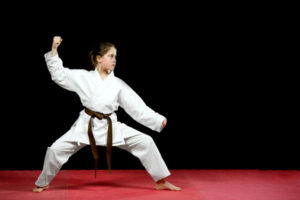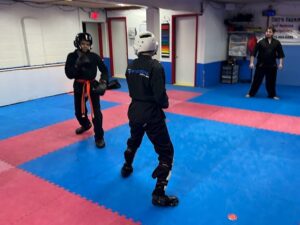Empowering children with leadership roles or tasks in martial arts classes, such as those offered by Transform Martial Arts in Hawthorne, New Jersey, can have a profound impact on their personal growth and development. At our dojang (training center), we are proud to serve the neighboring towns of Paterson, Fair Lawn, Prospect Park, and Glen Rock, and we believe in nurturing the potential of our young martial artists. You might have asked yourself, how come the instructor lets young children lead part of the class? This happens very often when one of our students leads the stretching/warm up part of the class. Also when we chose a student leader to lead a group action during class. Here are five compelling ways in which children can benefit from taking on leadership responsibilities in the dojang:
1. Enhanced Confidence and Self-Esteem
Giving children leadership roles, such as leading part of the class or instructing their peers, can significantly boost their confidence and self-esteem. At our martial arts classes in Hawthorne, New Jersey, we have witnessed how assuming these responsibilities allows them to develop a sense of competence and mastery, reinforcing their belief in their abilities and paving the way for greater self-assurance in various aspects of their lives.
2. Improved Communication and Public Speaking Skills
Participating in leadership roles in martial arts provides children with valuable opportunities to refine their communication and public speaking skills. When tasked with instructing or leading a portion of the class, they learn to articulate their thoughts clearly, project their voice, and effectively convey instructions, all of which are essential skills that can benefit them in academic, professional, and social settings.
3. Development of Empathy and Teamwork
Through leadership roles, children learn the importance of empathy and teamwork. At our dojang, we believe that when guiding their peers, they gain a deeper understanding of the needs and challenges of others, fostering a sense of empathy and compassion. Furthermore, assuming leadership responsibilities encourages them to work collaboratively with their peers, promoting a spirit of teamwork and cooperation within our martial arts community.
4. Reinforcement of Learning
Teaching part of the class or leading instructional segments reinforces children’s own learning. As they prepare to guide others, they must solidify their understanding of techniques and concepts, leading to deeper comprehension and retention of the material. This process of teaching others can serve as a powerful reinforcement of their own martial arts knowledge and skills.
5. Fostering a Sense of Responsibility and Discipline
Taking on leadership roles instills a sense of responsibility and discipline in children. Being entrusted with the task of guiding their peers encourages them to approach their training with dedication and attentiveness. They learn to honor commitments, prepare diligently for their leadership duties, and understand the importance of being reliable and accountable—a lesson that extends beyond the confines of the dojang.
In conclusion, providing children with leadership roles or tasks in martial arts, such as those offered in Hawthorne, New Jersey, by Transform Martial Arts, offers a multitude of benefits. From bolstering their confidence and communication skills to nurturing empathy, reinforcing learning, and cultivating a strong sense of responsibility and discipline, these opportunities for leadership can profoundly shape children’s character and contribute to their overall growth and development. Through these roles, children not only become more capable martial artists but also develop essential life skills that will serve them well into adulthood.



